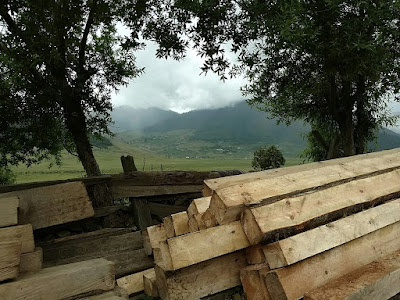Phobjikha valley in Bhutan, also known as Gangteng Valley is named after the impressive Gangteng Monastery of the Nyingma sect in central Bhutan.
At an average altitude of 3,000 metres, the valley is the most significant wintering ground of the rare and endangered Black‐necked cranes in Bhutan who migrate from the Tibetan Plateau to visit the valley during the winter season to roost.
 |
| Original pic of a blacked-necked crane sheltered at Crane Observatory, Phobjikha undergoing recovery. Date taken: June 16, 2017 |
The Black-neckedCrane (Grus nigricollis) is a medium-sized crane in Asia that breeds on the Tibetan Plateau and winters mainly in remote parts of India and Bhutan. The valley has been protected since time immemorial by the local people’s traditional respect for all living beings. As a result, over 300 cranes migrate to Bhutan to spend their winter months in this valley. There is a Crane Observatory overlooking the valley with telescopes installed providing a closer look at the birds strolling in the valley during winter season.
 |
| (Venue: Gangteng Monastery) |
First initiated in 1998, The Annual Black-necked Crane festival has become a part of the local culture in Phobjikha valley. Every year on the 11th (or 12th) of November, to express their joy and merriment, on the return of these majestic birds, the people of Phobjikha Valley, organise this splendid Festival in Gangteng Monastery.
The festival includes cultural programs such as folk songs and dances along with environmental conservation-themed dramas and songs. Tourists, locals and monks throng the premises of the monastery, enlightening people on the finer points of the temple and the festival. The highlight of this festival is ‘the crane dance’ performed by small children where they dress up as Black-necked cranes and go around in circles, flapping their wings.
The program usually starts by 9:30 am and lasts till late afternoon. The entrance fee collected is used for the support of the endangered black necked cranes.
The festival is organized by the Phobjikha Environment Management Committee (PEMC), a local group composed of elected local leaders, government representatives, business community representatives, monks and Royal Society for the Protection of Nature (RSPN) representatives.
The aim of this festival is to generate awareness and understanding on the importance of conserving the endangered Black‐necked cranes who are part of the cultural heritage of Bhutan. The cranes, which used to be hunted in Bhutan till 1980 are now totally protected, with the Government of Bhutan enacting a law under which any person killing a crane would invite life term jail sentence.
 |
| My sketch from my time in Phobjikha Valley |
Bhutan is a beautiful country. And Phobjikha Valley is the epitome of that beauty. The black-necked cranes only add to its ever-present splendour. At the onset of November, the valley fills with the sound of the cranes and all around happiness reigns.
This post was originally published by me at Himalayan Geographic.
Read it here: The Annual Black-necked Crane festival in Bhutan





Comments
Post a Comment